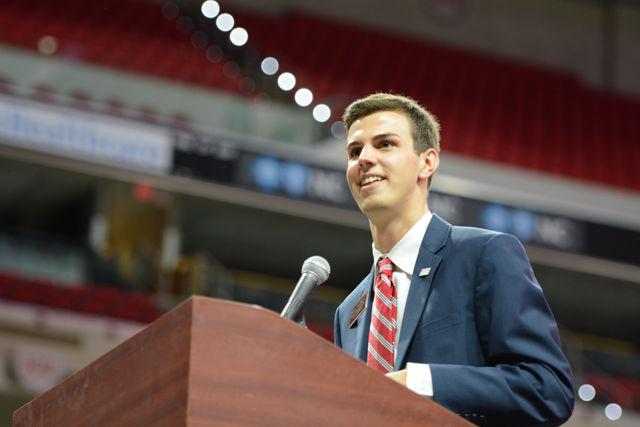In a letter to the editor published Tuesday night, Student Body President Paul Nolan, a senior studying materials science and engineering and political science, clarified comments he made about mental health. He also testified to his own commitment to stopping the stigma of mental health, mentioning his own search for counseling services.
“I encourage everyone to be a friend and to be an advocate for stopping the stigma,” Nolan said. “I hope in sharing my experience that everyone in the Wolfpack can understand that if this is something you’re struggling with, you’re not alone.”
Student Sen. Jacqueline Gonzalez, a junior studying political science, expressed her approval of Nolan’s letter.
“I’m really glad that he decided to put it into writing how he felt,” Gonzalez said. “I’m glad that he’s comfortable enough to be willing enough to tell everyone how he feels.”
The letter also addresses Nolan’s thoughts on the moderation of Wolfpack Students, the Facebook group for the student body of NC State, a recent topic of contentious debate in Student Senate. Drew Cox, an active participant on Wolfpack Students and senior studying aerospace engineering, said that he has sympathy for Nolan when it comes to making decisions about moderating the page and the contentious posts made on it.
“He’s in a tough position,” Cox said. “You have people going onto a Facebook page and spreading messages that other students don’t like, and he pretty much has to sit there and babysit, and decide where the line is. There’s plenty of other things to do as a student and as student body president.”
Before sending his letter to the editor this week, Nolan released an unsigned executive order on Feb. 7 that proposed guidelines for moderating Wolfpack Students. This order is only the third publicly released during his presidency, only one of which was signed.
Part of the order proposes moderation practices and an implicit agreement to be established when students join Wolfpack Students.
“I will not engage in any discriminatory conduct … that is sufficiently severe or pervasive to deny or limit an individual’s ability to participate in or benefit from NC State’s programs or activities or create an intimidating, threatening or abusive educational environment,” the agreement in the order read.
The order specifies age, disability, gender identity, race, religion and other factors as some of the bases of discriminatory conduct that would be considered.
The letter and executive order from Nolan come at a particularly turbulent time in discussions over moderating Wolfpack Students.
A bill sponsored by Sen. Adam Skrzecz, Student Senate legislative secretary and a sophomore studying political science, regarding Nolan’s handling of Wolfpack Students moderation was discussed and passed in Student Senate’s previous meeting on Feb. 9.
However, when asked to comment on Nolan’s letter to the editor, Skrzeck declined.
Skrzeck cited having done an interview on the subject recently as one of the reasons for refusing, but also said that he was following a general trend of Student Government participants declining to comment.
“As the main actors in the entire situation seem to be in the process of wrapping up publicizing their opinions, I think it’s best I do the same,” Skrzeck said.
Indeed, many Student Government participants have stopped commenting on the matter.*
“I’ve found closure in those remarks, and I don’t intend on talking any more about WPS,” Nolan said, citing his letter to the editor.
Sen. John Taylor Willis, a sophomore studying business administration and international studies, said that part of the reason students in Student Government were avoiding commenting on what is considered a controversial topic was for the sake of their upcoming campaigns for Student Government positions.
“It’s such a heated issue,” Willis said. “I’d say people are afraid of how their stances will affect their campaign … On all ends, there’s political complications that prevent people from wanting to support others.”
Sen. Mitchell Moravec, a senior studying material science and psychology, agreed that Wolfpack Students is a controversial subject and believes many in Student Government are, in part, unwilling to talk about it because of how complicated the issue is.
“It’s a can of worms to open up, and I don’t think a lot of people want to do that,” Moravec said. “It’s a hard issue to talk about, and Wolfpack Students is definitely a complicated and convoluted area of student input and chaos, and to begin that conversation or try to edit, modernize or regulate it requires a lot of critical discussion, a lot of voices, a lot of input from all sides about what the best path is … It’s hard to navigate that while still being a student.”
*Editor’s Note (02.20.2017): The author of this article has a close personal relationship with a member of the executive branch of Student Government and will not cover related topics in the future as per the Student Media Code of Ethics.
**Editor’s Note (02.20.2017): Irrelevant and misleading information about Student Government members has been removed from this article.








